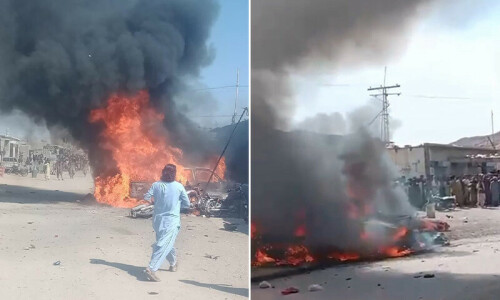• Fears rise over ‘default-like situation’ in PSO, two gas utilities
• Govt insists gas supply disconnection to CPPs ‘recipe for disaster’ for three firms
• Lender voices concern over missed provincial surplus target
ISLAMABAD: The International Monetary Fund (IMF) and the government appeared to be in a fix over energy sector issues amid rising fears of a potential default-like situation in some blue-chip public sector entities, raising question marks over the quality and design of the $7 billion loan programme signed only two months ago.
The visiting IMF team, led by mission chief Nathan Porter, also reportedly expressed concerns over provincial cash surplus targets missed in the first quarter, largely due to the Punjab government’s overspending of about Rs160 billion. As a result, the national target of Rs350bn for provincial budget surplus was missed even though three other provinces met their commitments.
The IMF was informed that legislation for agricultural income tax would be introduced in Punjab soon, followed by Sindh. Later on Thursday, the Punjab Assembly passed the Punjab Agriculture Income Tax (Amendment) Bill 2024 amid a boycott of proceedings by government-allied PPP. All other provincial cabinets had reportedly cleared their respective, but uniform, draft laws.
Meanwhile, Minister of State for Revenue Ali Pervaiz Malik dismissed as baseless media rumours of a mini-budget or an increase in the petroleum levy. He assured that external financing needs were planned under the programme and that any gap would be hopefully bridged through a recent improvement in the current account, supported by better remittances and exports. He said the visiting IMF mission had not yet given its views.
“The credibility of programme negotiators in the IMF staff and the government is at risk if the Fund agrees to amend the programme condition so early, but three state-owned entities (SOEs) would default if they don’t,” said an official involved in the ongoing dialogue. This would fail one of the key programme objectives: reforming SOEs for improved service delivery and sector viability.
Sources told Dawn that the petroleum division and its subordinate companies, in a joint meeting of both petroleum and power divisions with the IMF team, explained that enforcing gas supply disconnection to industrial captive power plants (CPPs) was a recipe for formal default of Pakistan State Oil (PSO) and two gas companies — SNGPL and SSGCL.
These SOEs, all listed companies, are estimated to suffer annual losses of over Rs400bn.
Therefore, there is a strong possibility of a hybrid solution, letting the efficient CPPs operate on gas supply, even if it is at the full cost of imported regasified liquefied natural gas (RLNG), and shifting other inefficient CPPs to the electricity grid.
The IMF has collected all the financial, gas and RLNG supply data after the Sui gas companies and petroleum division painted an alarming situation.
Excessive gas supply shortage
Meanwhile, gas companies, with the tacit backing of the petroleum division, have resorted to excessive gas supply shortage at the retail distribution stage, particularly to residential consumers, to minimise their unaccounted-for gas (UFG) losses and create a gas pressure crisis in the pipeline, forcing the domestic field operators to shut down or reduce their gas wells at the risk of their reservoir collapse.
The government has also exercised a down-flex option in its LNG contract with Qatar, delaying five annual cargoes to 2026, but still faces a surplus of 12 cargoes.
About 200 million cubic feet per day (mmcfd) of gas output has been reduced at local oil and gas fields while another 250 to 300 mmcfd of imported RLNG would become surplus if supplies to CPPs are disconnected.
The power sector has already reduced its RLNG offtake by another 150 mmcfd. About 387 captive power plants are on the SNGPL network and over 400 on the SSGCL system. Therefore, the disconnection will potentially cost gas companies around Rs250bn annually.
K-Electric has also indicated that it will reduce its gas/LNG usage from 100 mmcfd to 50 mmcfd.
In the presence of the power division’s leadership, the petroleum division’s team complained that some powerful bureaucrats had transferred power companies’ liabilities to the petroleum sector to ensure that power sector balance sheets and circular debt looked good.
It was reported that over $6bn LNG-related infrastructure investment and around $4bn worth of annual LNG supply chain was put in place on the premise the RLNG would be utilised in “must-run power plants”, but these commitments were gradually diluted to 66pc “take or pay” and then to 33pc “take or pay” and ultimately to closure of expensive power plants.
Therefore, the power sector’s circular debt has largely stabilised but has proportionately developed in the gas sector. On top of the receiving end is Pakistan State Oil, which is bound by a sovereign contract to receive LNG from Qatar on a “take or pay” basis. The two gas companies are unable to make payments to PSO for LNG offtake and have been further declining throughput.
Published in Dawn, November 15th, 2024
















































